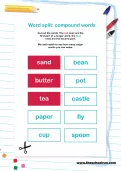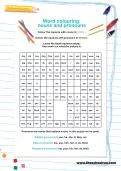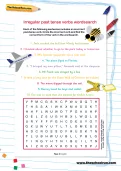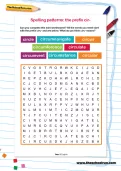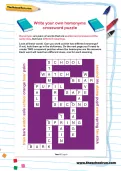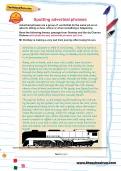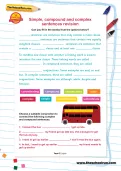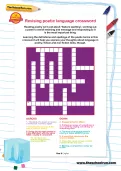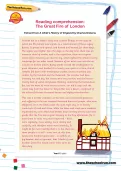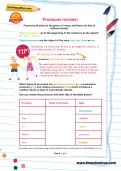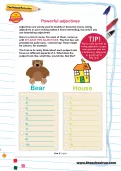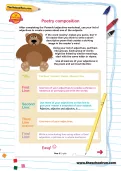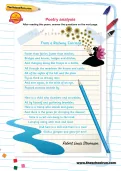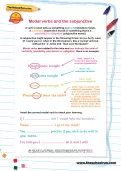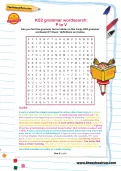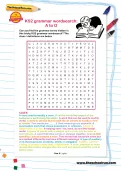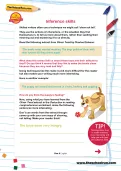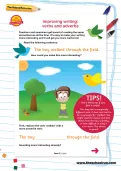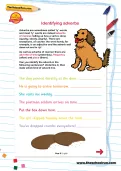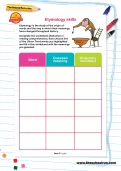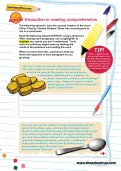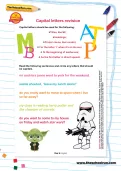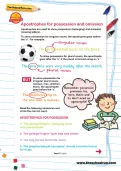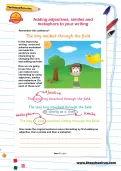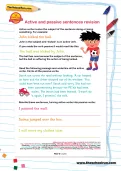Ks2 English worksheets
Free worksheets: Word puzzles, KS2
You’ll need to login or Register first to access these worksheets for free.
Once you’ve tried out our free worksheets, why not explore all our resources (1000s of worksheets, interactive tutorials, learning packs and more) with a 14-day FREE trial subscription.
Word split: compound words
A mix and match puzzle created by teachers, using compound words, to support primary school literacy and demonstrate examples of compound words.
Word colouring: nouns and pronouns
Colour the squares with nouns in green. Colour the squares with pronouns in brown. Leave the blank squares empty, then work out what the picture is.
Irregular past tense verbs wordsearch
A fun and free activity created by an experienced teacher with the aim of teaching KS2 children about irregular past tense verbs. Each of the sentences on the worksheet includes an incorrect past-tense verb. Circle the incorrect verb and then find the correct form of the verb in the wordsearch.
Spelling patterns: the prefix cir-
Can you complete this mini-wordsearch? All the words you need start with the prefix circ- and are below. What do you think circ- means?
Write your own homonyms crossword puzzle
Homonyms are pairs of words that are spelled and pronounced the same way, but have different meanings. Look at these words. Can you work out the two different meanings?
If not, look them up in the dictionary. On the next page you’ll need to create TWO crossword puzzles where the homonyms are the answers. Each word will need two different clues, one for each meaning.
If not, look them up in the dictionary. On the next page you’ll need to create TWO crossword puzzles where the homonyms are the answers. Each word will need two different clues, one for each meaning.
Spotting adverbial phrases
Adverbial phrases are a group of words that do the same job as an adverb, telling us how, where or when something is happening. Read the following famous passage Dombey and Son by Charles Dickens and underline any adverbial phrases you find.
Simple, compound and complex sentences revision
Can you fill in the blanks from these options? Then choose a suitable conjunction to connect the following complex and compound sentences.
Revising poetic language crossword
Reading poetry isn’t just about ‘feature spotting’; working out a poem’s overall meaning and message and responding to it is the most important thing. Learning the definitions and spellings of the poetic terms in this crossword will help you express your thoughts about language in poetry, fiction and non-fiction texts, though.
Reading comprehension: The Great Fire of London
Read this extract from A Child’s History of England by Charles Dickens then answer the questions below.
Pronouns revision
Pronouns all stand in the place of nouns, but there are lots of different kinds! Can you match the pronouns with their title in the table?
Powerful adjectives
Adjectives are words use to modify or describe nouns. Using adjectives in your writing makes it more interesting, but only if you use interesting adjectives! Here is a list of nouns. For each of them, come up with AT LEAST TEN ADJECTIVES. The first few will probably be quite easy – and boring! These might be colours, for example. The trick is to really think about each subject and focus on different aspects of it. What does the subject look like, smell like, sound like, feel like?
Poetry composition
If the word ‘poetry’ makes you panic, don’t! It’s easier than you think to write a short descriptive poem that creates a striking image in the reader’s mind. Why not have a go?
Modal verbs and the subjunctive
Modal verbs are related to this idea and can indicate the level of certainty, possibility, permission or obligation. Insert the correct modal verb into these sentences.
KS2 grammar wordsearch: P to V
Can you find the grammar terms hidden in this tricky KS2 grammar wordsearch?
KS2 grammar wordsearch: A to O
Can you find the grammar terms hidden in this tricky KS2 grammar wordsearch?
Inference skills
Skilled writers often use a technique we might call ‘show not tell’. They use the actions of characters, or the situation they find themselves in, to tell us more about them, rather than spelling their meaning out and explaining it to us directly. Can you use your inference skills on this passage?
Improving writing: verbs and adverbs
Teachers and examiners get bored of reading the same old sentences all the time. It’s easy to make your writing more interesting and it will get you more marks too! Try and make the sentence 'The boy walked through the field' more interesting by using powerful verbs and adverbs.
Identifying adverbs
As well as adverbs of manner there are adverbs of time (yesterday), frequency (often) and place (there). Can you identify the adverb in the following sentences? Underline it, then state which kind of adverb it is.
Etymology skills
Etymology is the study of the origin of words and the way in which their meanings have changed throughout history. Complete the worksheet Deduction in reading comprehension, then choose five of the Oliver Twist words you highlighted and fill in this worksheet with the meanings
you guessed.
you guessed.
Deduction in reading comprehension
The following extract is from the second chapter of the novel Oliver Twist by Charles Dickens. Oliver has recently gone to live in a workhouse. Firstly highlight any words you don't understand and see if you can work out what they mean. Then summarise what is happening in each paragraph.
Capital letters revision
Do you know all the occasions when capital letters should be used? Read the following sentences and circle any letters that should be capitals.
Apostrophes for possession and omission
Apostrophes are used to show possession (belonging) and omission (missing letters). To show possession for singular nouns, the apostrophe goes before the ‘s’. To show possession for plural nouns, the apostrophe goes after the ‘s,’ if the plural is formed using an ‘s.’But to show possession for irregular plural nouns (women, men, children, mice), the apostrophe goes before the ‘s’. Read the following sentences and circle the correct word.
Adding adjectives, similes and metaphors to your writing
The boy walked through the field.... a bit of a boring sentence, yes? Can you make it more interesting by first adding an adjective, then a simile and then a metaphor.
Active and passive sentences revision
Can you spot the difference between an active and passive verb? Read the following passage and underline all the active verbs, then circle all the passive verbs.
